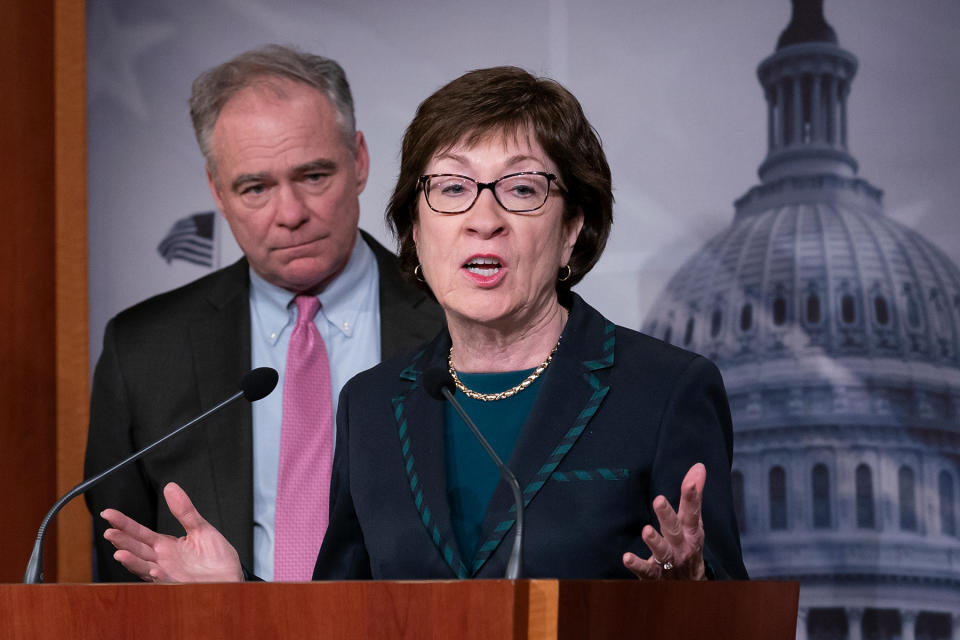Why Are Pro-Choice Groups Furious Over a Bill To Codify Roe?

On Monday, four centrist senators rolled out a bill that, if passed, promises to codify Roe, the long-standing Supreme Court precedent that protected women’s right to access abortion for almost five decades. “After the Supreme Court gutted a woman’s right to make personal health care decisions, Congress must restore that right,” Sen. Tim Kaine (D-Va.), one of the bill’s chief sponsors, said in a statement. “That’s why I’ve worked with my colleagues to find common ground on this bipartisan compromise that would do just that.”
The reaction from reproductive rights groups was swift and unambiguous: They hated it. “This bill has been written for a world that does not exist and would provide little solace in the nightmare we are living,” a coalition of 15 organizations, including the ACLU, Planned Parenthood, NARAL Pro-Choice America, and the Center for Reproductive Rights declared in a joint statement.
More from Rolling Stone
Why are the staunchest defenders of the right to abortion opposed to a bill that would, in Kaine’s words, “return the law to the place that it was before Dobbs was decided”? Their short answer is: a) it wouldn’t, b) even on the day before Dobbs was decided there were huge swaths of the country in which abortion was illegal, and c) the sponsors of this bill themselves admit it has zero chance of passage anyway.
“This is political theater,” says Mini Timmaraju, president of NARAL. “And I get that the Senate is a lot of political theater … [but] we cannot, in this moment, morally compromise on any of the issues in this bill. We can’t move backwards, and that’s what their bill does: in the spirit of bipartisanship, it takes us backwards. And that’s not acceptable.”
For clues about just how unserious the bill is, advocates say, one can start by looking at its sponsors. In addition to Kaine, who personally opposes abortion, the bill is co-sponsored by Krysten Sinema (D-Ariz.), a practicing corporatist who personally opposes eliminating the filibuster (a necessity to pass this piece of legislation), Lisa Murkowski (R-Alaska), a pro-choice Republican up for reelection this year, and Susan Collins (R-Maine), who, with her credulous confirmation of Brett Kavanaugh and Neil Gorsuch, helped personally guarantee the current reality for millions of American women who cannot access abortion.
One of the problems advocates see in attempting to craft a “bipartisan” abortion bill is the fact there is no bipartisan will to do so. The vast majority of Republican senators (47 out of 50) are on record opposing Roe. The only way to pass legislation of this kind would be to get rid of the filibuster, a move that three of the bill’s sponsors — Sinema, Collins, and Murkowski — have both consistently and unequivocally opposed.
But even if sufficient support existed to pass it, opponents say the bill is a mess of half-measures. Their specific problems with it are numerous. “It does not prohibit pre-viability abortion bans, like what was required in Roe and Casey. It regurgitates that watered-down legal standard from the Supreme Court, the ‘undue burden’ standard, which has allowed states to pass hundreds of abortion restrictions. It includes a so-called ‘conscience provision,’ which allows religiously affiliated health care providers to decide that they won’t perform abortions if they felt there’s a conflict with their religious beliefs. It also doesn’t prohibit those vigilante-enforced bans we’ve seen in Oklahoma and Texas,” says Jody Rabhan, chief policy counsel for the National Coalition of Jewish Women, one of the groups that blasted the proposed law. “On top of all of that, one of the solutions within the bill is it would allow any of these abortion bans to go back to the very justices on the Supreme Court that overturned Roe and Casey.”
The same way that you can’t be a little bit pregnant, advocates argue, you can’t be a little bit pro-choice: You either believe women have a fundamental right to make decisions about their own bodies or you don’t. “I think we have some senators who really, truly believe in bipartisan compromise, and what we have to remind them, as advocates for people who are literally dying because of these bans, is we will not compromise on this issue,” NARAL’s Timmaraju says.
A similar bill first appeared back in February, sponsored by Collins and Murkowski, when it was presented as an alternative to the considerably more robust Women’s Health Protection Act, legislation that was crafted over years of conversations with the same groups that have gone on record opposing Kaine’s bill. WHPA has passed the House of Representatives twice, but it failed in the Senate in May by a vote of 49-51, with both Collins and Murkowski opposed.
What most frustrates reproductive rights advocates about this anemic “bipartisan bill” is the fact that an overwhelming bipartisan consensus on abortion does exist in this country — just not in the Senate. One day after Kaine’s bill was introduced, roughly 60 percent of voters in conservative Kansas rejected a ballot measure that would have amended the state’s constitution to eliminate the right to abortion. The vote in Kansas tracked with national polling, which show that 6 out of 10 Americans believe abortion should be legal in all or most cases.
If voters in one of the reddest states in the country overwhelmingly support protecting abortion access, advocates wonder, why is it that a democratically controlled Senate cannot do anything to protect abortion access? “People are enraged, and they’re motivated, and looking for bold action on this issue right now,” Rachel Fey, of the group Power to Decide, says. “And this is not it.”
Best of Rolling Stone

